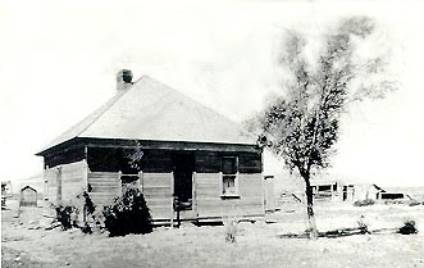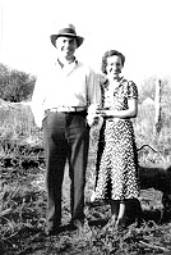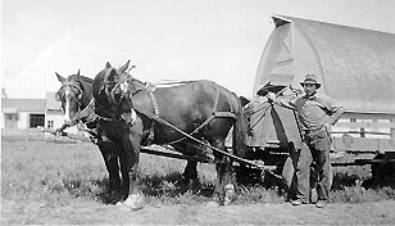
Vernell page 4

Going back to
visit the spot where our house used to be was, indeed, sad. There was
nothing there. Hardly any
evidence that there ever was a house, barn, shop, corrals,…garden.
The windmill had been taken down or hauled away, the well was
partly filled in, but we found an old battered dish-pan and a fender off
the old Star car. We found my Mom’s old cookstove, about where the house used
to set. (note by Vonda: I
have the name plate from that stove still in my possession.)
…
From our place
to the east there were no fences. The
horses could range as far as they wanted to go.
It was my job to wrangle these horses in, every morning.
Later on, the Hawks brothers homesteaded to the south and east. They had a few cows and calves, along with all the
homesteaders close to us. The
herd consisted of milk cows and calves, yearlings and two year olds.
They hired me to keep their cattle back in the mountains.
I never
considered myself a cowboy, but when I think back, I sure had a good
start,
didn’t
I?
…
In the winter
of 1927 I went to Washington and stayed a year.
When I came back I worked at several jobs…”
WEDDING
DAY

The day they got married, Vernell and OrMeda took her mother and aunt to the State Fair. While there, they proceeded to loose them in the crowd and left to get married. They returned a short time later, found them and returned home. When they got to the door, they said that they were married.
Vernell’s
version:
They met at a
dance, he said. His friend Jim Hawks wanted to dance with Mom, but she would
run and hide and not dance with him. She
was just a kid so Dad hadn’t paid much attention to her until then.
He said he
never would have put her on an unbroken horse.
“She and a friend got on a horse one time and rode off somewhere and
they got thrown. Your Mom didn’t like horses after that. I put her
on in front of me one time, but I
wouldn’t have ever put her on an
unbroken horse.”
Or
Meda’s version:
“We met at a dance. We
girls used to dance with each other and I would always lead.
Jim Hawks kept asking me to dance. I
would say, ‘okay’ and then go to the ladies room so I wouldn’t have to.
Then one time, he grabbed hold of me so I couldn’t go and he made me
dance with him. That was the first
time I ever danced with a boy.”
“But there was a time when your Dad came riding along and I got on in front of him. I didn’t know until later that he was breaking the horse at the time. I probably wouldn’t have gotten on if I had known.”
Some years later Jim Hawks had some sort of break down and he was put in the institution in Salem for a time. I can remember that Dad used to go and visit him from time to time and then when he got out, he came and visited us. He used to earn money while he was there by selling candy. I asked Dad why he had been committed, and he said, “Oh, he shot a cow because he thought it was a bear.” That probably wasn’t the reason, but that is what he told me. They both said, “Jim Hawks introduced us and then he went crazy and had to be committed.”
On to Oregon

In the 1930’s the Federal Land Bank purchased all the land that was
mortgaged, taking all the farmland and turned it back into range land.
It was the depression and the government said that the farmers
were over producing wheat. They had the idea to give the farmers a chance to move to the
Willamette Valley to small dairy farms.
Out of the
eighty families that moved there from our area, only three families
stayed. I was a late comer.
I had a job driving truck for Oneida County, and was doing okay.
But, after three years of families leaving, my friends and family
were writing me to come up and take one of the farms.
I felt so sorry
for OrMeda’s mother. After
Rube died she was so much a part of our family.
I will never forget her standing there crying and holding onto
Oakley. She kept saying,
“Why do you have to go so far away?”
We liked our
two bedroom house and the twelve cow barn.
It nestled just below some green rolling hills that reminded me
of home. The way the
government had it figured out, on sixty acres a man could raise feed
enough to feed the cows and sell milk and pay for the farm.
The took a mortgage on the farm to pay for the cattle and two
work horses. On the place I
took, there were only about forty acres I could farm, because a dry
creek run through and cut a wide canyon in my field. After three years, we were living, but couldn’t pay the
mortgage.
It was hard to leave the nice little home and all the hopes of owning my own place. But, by now I had two children and jobs were to be had in town. So, we left the farm and I went to work at Engle and Worth sawmill and worked there for sixteen years, when they went out of business. I then took a job with the County, and worked for over fifteen years for them.
| Page 1 | Page 2 | Page 3 | Page 5 | Home |